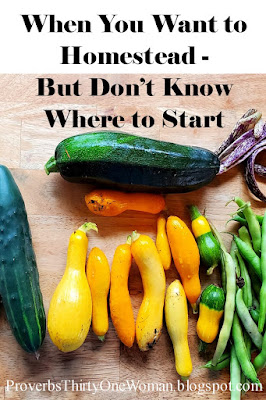First things first: Homesteading is not something you can jump into all at once. That is to say, unless you are very wealthy, you cannot expect to go from non-homesteader to someone with a fully working farm overnight - or even, probably, within a year's time. It takes time to build a homestead. And frankly, even if you lived in a fantasy world where your fairy godmother could magically whip up your ideal homestead in seconds. I'd still steer you away from using her services...because homesteading requires a lot of skill. If you start out with everything you want (huge garden, chickens, cattle, pigs, and so on), you will fail. A lot. It's just too much new stuff to learn all at once. However, if you take on one project at a time, you will still have some failures, but they will be less costly overall, and you'll more easily adapt and learn from those mistakes.
So if you feel like you have to do all the things right now - take a deep breath.Then release that idea as a fantasy that won't serve you well.
Start Where You Are
The number one thing I see holding people back from a homesteading life is land. While I agree that you probably cannot grow all your food in the suburbs, it's a mistake to wait until you can buy land to begin your homesteading journey.
 |
| Quail are a nice option for small homesteads. |
Remember, homesteading is mostly about skills - not things. You have a lot to learn, and frankly, it is easier if you start small. So...if you live in the city, by all means start saving up for land, but in the meantime, grow food on your windowsill, on your balcony, on your rooftop, and in a community garden. If you live in the suburbs, save for and look for land, but in the meantime, use your front and back yard for homesteading. A LOT can be done on the average suburban lot! (And if you live where HOA rules prevent you from homesteading, your first step ought to be to sell your HOA house and move to a house where you can enjoy more freedom.)
Start NOW and reap the benefits NOW while you learn skills that will help you manage a larger homestead later.
Where I Recommend Beginning
 |
| Dehydrating is an easy way to preserve food. |
Unless you eat carnivore, I highly recommend beginning your homesteading adventure by putting in a vegetable garden. When I lived in the suburbs, we had a veggie plot in the back yard...and when the neighbor's trees started shading that more than I liked, I kept only shade-tolerant crops there, and started planting sun-loving crops in the front yard. I had columnar apple trees, berries, hardy kiwi vines, and pretty much every planter grew some type food. You will learn a lot with a small garden - and make no mistake, gardens are the backbone of most homesteads.
Next, learn to preserve the food you grow. Learn to can, dehydrate, and properly freeze. Establish a deep pantry. Add some water to your pantry, for emergencies. Add a backup generator and consider how you will light and heat your home if you have an extended power outage. (When we lived in the suburbs, we had kerosene lamps and a wood stove for such occasions.)
Once you've got a handle on growing plants for food, if you eat eggs, I recommend getting chickens. You'll want at least 2, since they are social animals, but if you don't want to buy store bought eggs again, I recommend about 2 chickens per person in your household. Yes, most cities have ordinances about how many chickens citizens may own in the suburbs, but these days, those rules usually allow for a decent-sized flock for the average family.
 |
| An Australorp chick. |
When you've got the hang of chickens, think about meat production. For beginners, chickens and rabbits are easiest and neither takes up much room. Quail are another good option for small spaces, though they tend to be more stinky.
If you achieve all this, you'll be raising a great deal of your food - and you'll be far ahead of someone who is still making excuses about why they can't start homesteading!
More Articles to Get You Started Homesteading:
Realistic First Year Homesteading Expectations
Top 10 Tips for New Vegetable Gardeners
Fruits and Vegetables - Even From a Small Yard
How to Plan a Small Vegetable Garden
Easiest Fruits and Vegetables to Grow
Deciding What to Plant in Your Vegetable Garden
Starting a Vegetable Garden on a Budget
Newbie Vegetable Gardening Mistakes - and How to Avoid Them
Gardening From Scratch (part 1, part 2, part 3)
Why Apples Are the Best Homestead Fruit Crop
Why Winter Squash is the Perfect Homestead Food Crop
8 Common Chicken-Keeping Mistakes and How to Avoid Them
Chickens 101: Buying Chickens and Caring for Chicks
Chickens 101: Setting Up the Hen House and Run
Predator Proof Your Chicken Coop and Run
An Introduction to Raising Rabbits for Meat
How and Why to Raise Coturnix Quail for Meat











No comments